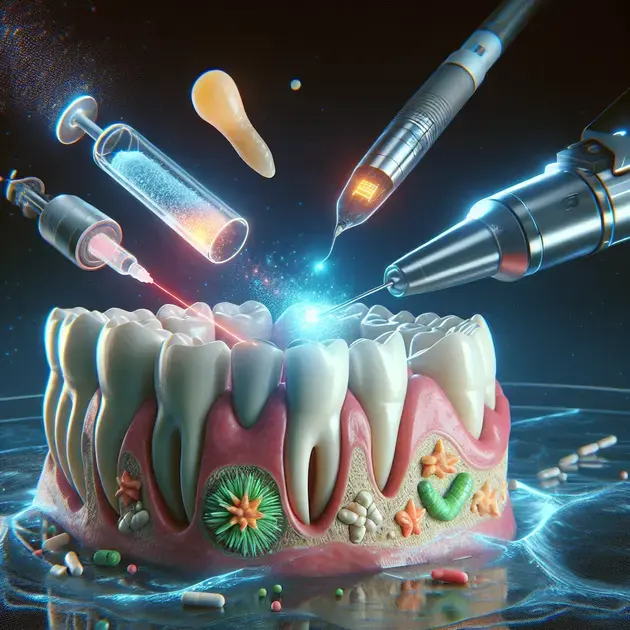When it comes to dealing with periodontitis, finding the most effective medication is crucial for managing and treating this common dental condition. With so many options available, it can be overwhelming to determine the best course of action. This comprehensive guide will explore the various medications used to combat periodontitis, their benefits, and potential side effects.
Recent studies have shown promising results for a new generation of medications specifically designed to target the root causes of periodontitis. By understanding how these medications work and incorporating them into your oral health routine, you can take proactive steps towards combating periodontal disease and maintaining optimal dental hygiene.

Understanding Periodontitis and Its Impact on Oral Health
Periodontitis is a serious gum infection that damages the soft tissue and destroys the bone that supports your teeth. It is caused by bacteria in plaque, a sticky white film that forms on your teeth. If not properly treated, periodontitis can lead to tooth loss and other health problems.
To understand the impact of periodontitis on oral health, it is essential to recognize the symptoms early on. These may include red, swollen gums, tender gums, bleeding when brushing or flossing, receding gums, persistent bad breath, and loose teeth. If you experience any of these symptoms, it is crucial to seek professional dental care.
One effective way to prevent and treat periodontitis is by maintaining good oral hygiene practices. This includes brushing your teeth at least twice a day, flossing daily, using mouthwash, and visiting your dentist regularly for check-ups and cleanings. Additionally, a balanced diet rich in fruits and vegetables can help support gum health.
For a comprehensive understanding of periodontitis and its impact on oral health, you can refer to reputable websites such as the American Dental Association (ADA) or the Centers for Disease Control and Prevention (CDC). These sources offer valuable information on preventive measures, treatment options, and the importance of early intervention.
By staying informed and proactive about periodontitis, you can safeguard your oral health and overall well-being. Remember that prevention is key, so prioritize your dental care routine and seek professional help if you notice any signs of gum disease.
Exploring Different Medications for Treating Periodontitis
When it comes to treating periodontitis, various medications can be prescribed to help control the infection and promote healing. These medications may include antibiotics, antiseptic mouth rinses, and antimicrobial agents that target the bacteria causing the gum disease.
One commonly prescribed medication for periodontitis is doxycycline, an antibiotic that helps reduce inflammation and control bacterial growth in the gums. Doxycycline is typically taken in the form of tablets or capsules and may be combined with other treatments such as scaling and root planing for optimal results.
Another effective medication for treating periodontitis is chlorhexidine gluconate, a powerful antiseptic mouth rinse that helps reduce plaque and prevent gum infections. This rinse is often recommended for use after dental procedures or as part of a daily oral hygiene regimen to maintain gum health.
To explore different medications for treating periodontitis in more detail, you can consult reliable sources like the National Institute of Dental and Craniofacial Research (NIDCR) or the Mayo Clinic. These sources provide comprehensive information on medication options, dosage instructions, and potential side effects.
Before starting any medication for periodontitis, it is important to consult with your dentist or healthcare provider to determine the most suitable treatment plan for your individual needs. By exploring different medication options and following your dentist’s recommendations, you can effectively manage and treat periodontitis.
Incorporating Effective Medication into Your Dental Care Routine
Integrating medication into your dental care routine is essential for successfully managing periodontitis and maintaining optimal oral health. By following a prescribed medication regimen consistently, you can help control the infection, reduce inflammation, and prevent further damage to your gums and teeth.
Start by discussing your medication options with your dentist or periodontist to determine the most appropriate treatment plan for your condition. They may recommend antibiotics, antimicrobial mouthwashes, or other medications to supplement your oral hygiene routine and combat periodontitis.
When incorporating medication into your dental care routine, remember to follow the prescribed dosage and schedule provided by your healthcare provider. Consistency is key to achieving positive outcomes, so be diligent in taking your medications as directed and attending follow-up appointments as needed.
In addition to medication, it is important to maintain good oral hygiene practices such as regular brushing, flossing, and dental check-ups. These habits, combined with prescribed medication, can help control periodontitis and promote long-term gum health.
To ensure you are effectively incorporating medication into your dental care routine, seek guidance from reputable dental websites like Colgate or the Oral Health Foundation. These resources offer tips on medication management, oral hygiene maintenance, and overall gum disease prevention.

**Exploring Various Treatment Options for Periodontitis**
Periodontitis is a serious gum infection that can lead to tooth loss and other oral health issues if left untreated. Fortunately, there are various treatment options available to help manage and improve the condition. One common treatment option is scaling and root planing, a deep cleaning procedure that removes plaque and tartar from the teeth and roots. This treatment helps reduce inflammation and prevent the progression of gum disease.
Another effective treatment for periodontitis is the use of antibiotics. These medications can help control the growth of bacteria in the mouth, reducing the severity of the infection. In some cases, surgical interventions may be necessary to treat advanced periodontitis. Procedures such as flap surgery and bone grafting can help restore the health of the gums and supporting structures of the teeth.
In addition to traditional treatments, there are also emerging therapies being explored for periodontitis. One such innovation is the use of photodynamic therapy, which involves the application of a photosensitive agent followed by exposure to a specific light wavelength. This treatment can help eliminate bacteria and improve gum health.
Patient education and regular dental visits are essential components of any treatment plan for periodontitis. By maintaining good oral hygiene practices and following the recommendations of your dentist or periodontist, you can effectively manage the condition and prevent further complications.
**New Approaches for Controlling Gum Infections**
Gum infections can cause discomfort and lead to more serious oral health issues if not properly addressed. In recent years, new approaches have been developed to help control and treat gum infections effectively. One innovative approach is the use of probiotics to promote a healthy balance of bacteria in the mouth.
Probiotic supplements containing beneficial bacteria can help reduce the growth of harmful bacteria that contribute to gum infections. By incorporating probiotics into your oral care routine, you can support gum health and reduce the risk of developing infections. Another new approach for controlling gum infections is the use of ozone therapy.
Ozone therapy involves the application of ozone gas to the affected area, which has antimicrobial properties that can help eliminate bacteria and promote healing. This non-invasive treatment option is gaining popularity for its effectiveness in treating gum infections. Laser therapy is another promising approach for controlling gum infections.
Laser therapy involves the use of concentrated beams of light to target and remove infected tissue, bacteria, and tartar from the gums. This minimally invasive procedure promotes faster healing and reduces the risk of complications associated with traditional gum infection treatments. By exploring these new approaches for controlling gum infections, patients can benefit from advanced and effective solutions for improving their oral health.
**Innovative Solutions to Enhance Gum Health**
Maintaining healthy gums is essential for overall oral health and well-being. In addition to regular dental care and good oral hygiene practices, there are innovative solutions available to enhance gum health and prevent issues such as gum disease. One such solution is the use of herbal mouthwashes containing ingredients like tea tree oil and aloe vera.
These natural ingredients have antimicrobial properties that can help reduce inflammation and promote gum healing. Regular use of herbal mouthwashes can support gum health and prevent the development of gum disease. Another innovative solution to enhance gum health is the use of vitamin C supplements.
Vitamin C is essential for collagen production and maintaining the strength of the gums. By incorporating vitamin C supplements into your daily routine, you can support gum health and reduce the risk of gum disease. Additionally, advancements in oral hygiene technology have led to the development of electric toothbrushes and water flossers.
These tools can help effectively remove plaque and bacteria from the teeth and gums, promoting better oral health. By exploring these innovative solutions and incorporating them into your oral care routine, you can enhance gum health and enjoy a healthier smile.
Conclusion
In conclusion, exploring various treatment options for periodontitis reveals a range of effective methods to manage and improve this serious gum infection. From traditional approaches like scaling and root planing to innovative therapies such as photodynamic therapy, there are solutions available to address the root causes of gum disease and prevent further complications. It is imperative to prioritize patient education and regular dental visits as essential components of any comprehensive treatment plan to ensure the effective management of periodontitis.
Moreover, the introduction of new approaches for controlling gum infections, such as probiotics, ozone therapy, and laser therapy, showcases the continual advancements in oral healthcare. These methods not only target harmful bacteria but also promote healing and reduce the risk of complications associated with traditional treatments. By embracing these innovative solutions, patients can benefit from advanced strategies that enhance their oral health and well-being.
Furthermore, the utilization of innovative solutions to enhance gum health, including herbal mouthwashes, vitamin C supplements, electric toothbrushes, and water flossers, underscores the importance of proactive oral care practices. By incorporating these tools and products into a daily oral hygiene routine, individuals can strengthen their gums, reduce inflammation, and mitigate the risk of developing gum diseases. Embracing these advancements in oral hygiene technology can lead to improved gum health and ultimately contribute to a healthier smile and overall well-being.



